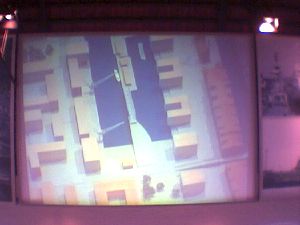![[Home]](../bilder/r2c-head1a.gif) GHS
GHS![[Home]](../bilder/r2c-head1a.gif) GHS
GHS|
The GHS (Gesellschaft für Hafen- und Standortentwicklung) is the official developer of the HafenCity. As a subsidiary company of the HHLA (Hamburger Hafen- und Lager AG), marketing and estate-management have been given completely to the GHS. Although the competent authority is the economical administration of Hamburg, the GHS is not bound to their instructions. There is no direct political control from the Senat, the senators of four municipal administrations (economy, environment, construction and culture) have only advisory functions in the supervisory board of the GHS. The political commission that the City of Hamburg gave to the GHS is profit-oriented: To make money by selling estates to private investors. |
|
The GHS (Gesellschaft für Hafen- und Standortentwicklung), a former subsidiary company of the HHLA (Hamburger Hafen- und Lagerhaus AG), is the official developer of the HafenCity. It is an independent, 100% city-owned Gmbh and holds the real-estates of the >City and Port Assets< in trust. Marketing and estate-management have been totally given to the GHS. The political commission given by the City of Hamburg to the GHS is profit-oriented: To make money by selling estates to private investors. The official competent authority for the GHS is the administration of economy, however, in practical terms, it is not bound to their instructions. Senators of three municipal administrations (economy, finance and construction) are members of the supervisory board of the GHS. The political control of the GHS is acted out via the senate (and therefore by the actual government coalition) and not via the citizenry (the parliament, i.e. the current opposition is excluded from influence). The supervisory board of the GHS has the power to dismiss the managing director (if wanted), while the senate is able to change the political commission (if intended). |
|
The GHS runs an information-center at the KesselHaus (owned by the HHLA) at Am Sandtorkai as an official marketing tool, similar to the former Infobox at Potsdamer Platz in Berlin. An important part of the marketing-concept of the KesselHaus is the huge, so called "interactive" (you can zoom in via cameras) HafenCityModell, that depicts the vision of the MasterPlan of the HafenCity. Public participation and concept-transparency are fictious: The MasterPlan refers to a public planning-dialogue, which never took place. The KesselHaus is described as a public place for discussions about the HafenCity, but there are no mechanisms to organize such a process. |
|
The GHS runs an information-center at the KesselHaus (owned by the HHLA) at Am Sandtorkai as an official marketing tool, similar to the former Infobox at Potsdamer Platz in Berlin. An important part of the marketing-concept of the KesselHaus is the huge, so called "interactive" (you can zoom in via cameras) HafenCityModell, that depicts the vision of the MasterPlan of the HafenCity. Public participation and concept-transparency are fictious: The MasterPlan refers to a public planning-dialogue, which never took place. The KesselHaus is described as a public place for discussions about the HafenCity, but there are no mechanisms to organize such a process. |
The GHS (Gesellschaft für Hafen- und Standortentwicklung), a former subsidiary company of the HHLA (Hamburger Hafen- und Lagerhaus AG), is the official developer of the HafenCity. It is an independent, 100% city-owned Gmbh and holds the real-estates of the >City and Port Assets< in trust. Marketing and estate-management have been totally given to the GHS. The political commission given by the City of Hamburg to the GHS is profit-oriented: To make money by selling estates to private investors. The official competent authority for the GHS is the administration of economy, however, in practical terms, it is not bound to their instructions. Senators of three municipal administrations (economy, finance and construction) are members of the supervisory board of the GHS. The political control of the GHS is acted out via the senate (and therefore by the actual government coalition) and not via the citizenry (the parliament, i.e. the current opposition is excluded from influence). The supervisory board of the GHS has the power to dismiss the managing director (if wanted), while the senate is able to change the political commission (if intended).
The GHS runs an information-center at the KesselHaus (owned by the HHLA) at Am Sandtorkai as an official marketing tool, similar to the former Infobox at Potsdamer Platz in Berlin. An important part of the marketing-concept of the KesselHaus is the huge, so called "interactive" (you can zoom in via cameras) HafenCityModell, that depicts the vision of the MasterPlan of the HafenCity. Public participation and concept-transparency are fictious: The MasterPlan refers to a public planning-dialogue, which never took place. The KesselHaus is described as a public place for discussions about the HafenCity, but there are no mechanisms to organize such a process.
# Hamburger Hafen- und Lagerhaus AG [HHLA] | # Municipal information about commerce and harbour at [hamburg.de]
# Hafencity information-center and marketing tool KesselHaus | # Official HafenCityModell | # GHS-Info in german [Die GHS]
 Model-screen in the Kesselhaus of the GHS
Model-screen in the Kesselhaus of the GHS
Back to HafenCity